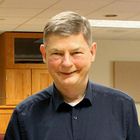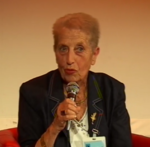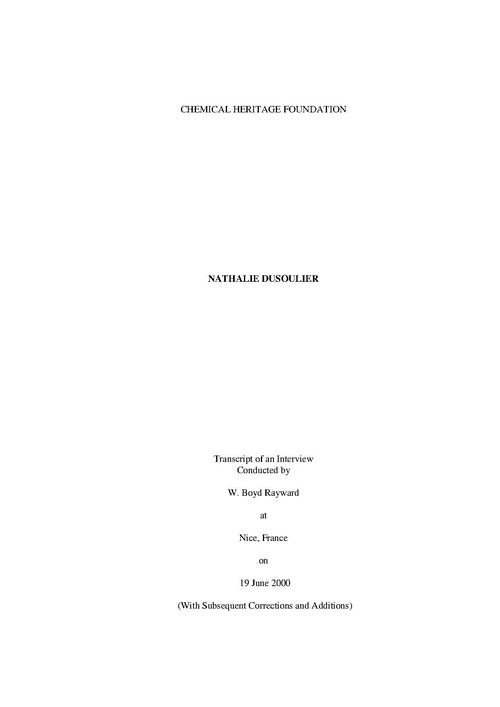Interview Dusoulier (2000) Rayward : Différence entre versions
(→Table des matières) |
(→Intervieweur) |
||
| (47 révisions intermédiaires par 2 utilisateurs non affichées) | |||
| Ligne 1 : | Ligne 1 : | ||
| − | {{ | + | {{Interview Dusoulier (2000) Rayward/Header|sous-titre=Introduction}} |
| + | {|width=100% | ||
| + | |- | ||
| + | |width=30%| | ||
| + | __TOC__ | ||
| + | |width=15%|[[File:Rayward illinois.edu.jpg|140px|center|link=Warden Boyd Rayward]] | ||
| + | |width=15%|[[File:NathalieDousoulierInist20ans.png|150px|center|link=Nathalie Dusoulier]] | ||
| + | |width=40%| | ||
| + | {|align="right" | ||
| + | |- | ||
| + | |[[File:LogoChemicalHeritageFoundation.png|50px|left]] | ||
| + | |Chemical Heritage Foundation<br/>([[Science History Institute]])<br/>Oral program history | ||
| + | |[[File:LogoChemicalHeritageFoundation.png|50px|right]] | ||
| + | |- | ||
| + | |} | ||
| + | |- | ||
| + | |} | ||
{{Wicri travaux | {{Wicri travaux | ||
|texte=Ouvrage en cours de structuration de traduction et de mise en forme | |texte=Ouvrage en cours de structuration de traduction et de mise en forme | ||
}} | }} | ||
| − | Cette page introduit une interview de [[Nathalie Dusoulier]] par [[Warden Boyd Rayward|W. Boyd Rayward]]. Elle a été donnée à [[A pour localité citée::Nice]] en 2000 dans le cadre des activités du ''Chemical Heritage Foundation''. | + | Cette page introduit une interview de [[A pour personnalité interviewée::Nathalie Dusoulier]], réalisée en [[A pour date de création::2000]], par [[A pour premier auteur::Warden Boyd Rayward|W. Boyd Rayward]]. |
| − | + | ==Présentation== | |
| + | Elle a été donnée à [[A pour localité citée::Nice]] en 2000 dans le cadre des activités du ''Chemical Heritage Foundation''. | ||
==Résumé== | ==Résumé== | ||
| − | + | {{Interview Dusoulier (2000) Rayward/Anglais|Main Page#ABSTRACT}} | |
{{Corps article/Début}} | {{Corps article/Début}} | ||
Nathalie Dusoulier commence cet entretien en évoquant ses origines familiales et son éducation. | Nathalie Dusoulier commence cet entretien en évoquant ses origines familiales et son éducation. | ||
| Ligne 18 : | Ligne 35 : | ||
==Intervieweur== | ==Intervieweur== | ||
| − | + | {{Interview Dusoulier (2000) Rayward/Anglais|Main Page#INTERVIEWER}} | |
{{Corps article/Début}} | {{Corps article/Début}} | ||
| − | + | W. Boyd Rayward est professeur de recherche à la Graduate School of Library and Information Science de l'Université de l'Illinois, Urbana-Champaign. Il s'est tourné vers la bibliothéconomie après avoir obtenu un diplôme de littérature anglaise à l'Université de Sydney. Il a obtenu son doctorat de la Graduate Library School de l'université de Chicago en 1973. Il a occupé des postes à l'[[A pour organisme cité::Université de Chicago]] (où il est devenu doyen de la Graduate Library School). Il a été professeur et directeur de la School of Information Library and Archive Studies et doyen de la faculté des études professionnelles de l'université de New South Wales à Sydney, où il est aujourd'hui professeur émérite. Il a publié deux ouvrages sur [[A pour personnalité citée::Paul Otlet]], documentaliste et internationaliste belge, et de nombreux articles sur l'histoire des dispositifs nationaux et internationaux d'organisation et de diffusion de l'information. | |
| − | Information Science | ||
{{Corps article/Fin}} | {{Corps article/Fin}} | ||
| + | |||
| + | ==Nathalie Dusoulier== | ||
| + | {{Wicri article détaillé|texte=<big>[[Interview Dusoulier (2000) Rayward/Nathalie Dusoulier|Nathalie Dusoulier, repères biographiques]]</big>}} | ||
| + | |||
==Table des matières== | ==Table des matières== | ||
| + | {{Interview Dusoulier (2000) Rayward/Anglais|Main Page#TABLE OF CONTENTS}} | ||
{{Corps article/Début}} | {{Corps article/Début}} | ||
| − | ;[[Interview Dusoulier (2000) Rayward/CNRS#Education and Early Career|{{Surligné|yellow|Education and Early Career}}]]:{{Surligné|yellow|Family background. | + | ;[[Interview Dusoulier (2000) Rayward/CNRS#Education and Early Career|{{Surligné|yellow|Education and Early Career}}]]:{{Surligné|yellow|Family background.}} [[Interview Dusoulier (2000) Rayward/CNRS#Parcours éducatif|Parcours éducatif]]. [[Interview Dusoulier (2000) Rayward/CNRS#Accident de voiture|Accident de voiture]]. |
| − | ;[[Interview Dusoulier (2000) Rayward/CNRS#Employment at Centre National de la Recherche Scientifique|Entrée au Centre National de la Recherche Scientifique (CNRS)]]:{{Surligné|yellow|Hiring. Organizational structure of CNRS. Early indexing methods. Dr. Pierre Brygoo. Jean Wyart. Directing the biology and human sciences sections of the <i>Bulletin Signalétique</i>. | + | ;[[Interview Dusoulier (2000) Rayward/CNRS#Employment at Centre National de la Recherche Scientifique|Entrée au Centre National de la Recherche Scientifique (CNRS)]]:{{Surligné|yellow|Hiring. Organizational structure of CNRS. Early indexing methods.}} [[Interview Dusoulier (2000) Rayward/CNRS#Dr. Pierre Brygoo|Dr. Pierre Brygoo]]. [[Interview Dusoulier (2000) Rayward/CNRS#Jean Wyart|Jean Wyart]]. {{Surligné|yellow|Directing the biology and human sciences sections of the <i>Bulletin Signalétique</i>.}} [[Interview Dusoulier (2000) Rayward/CNRS#Les débuts de l'automatisation et de l'informatisation|Les débuts de l'automatisation et de l'informatisation]]. [[Interview Dusoulier (2000) Rayward/CNRS#ICSU AB|ICSU AB, Bureau des résumés analytiques du Conseil international des unions scientifiques]]. [[Interview Dusoulier (2000) Rayward/CNRS#Utilisation de Pascal|Utilisation de Pascal]]. |
| − | ;Institut de l’Information Scientifique et Technique (INIST): | + | ;[[Interview Dusoulier (2000) Rayward/INIST|Institut de l’Information Scientifique et Technique (INIST)]]: [[Interview Dusoulier (2000) Rayward/INIST#Commercialisation|Commercialisation]]. [[Interview Dusoulier (2000) Rayward/INIST#Coopérations avec les organisations internationales|Coopérations avec les organisations internationales]]. Caroline Wiegandt-Sakoun. |
| − | ;Conversation | + | ;[[Interview Dusoulier (2000) Rayward/Organisations|Conversation sur diverses organisations]] : [[Interview Dusoulier (2000) Rayward/Organisations#Les coopérations de l'ICSU AB avec les organisations internationales|Les coopérations de l'ICSU AB avec les organisations internationales]]{{Surligné|yellow|Dealing with language barriers. Modern reconceptualization of ICSU AB and United Nations Educational, Scientific and Cultural Organization Programme Générale d’Information [UNESCO PGI]. Federation for Information and Documentation [FID]. The International Federation of Library Associations and Institutions [IFLA].}} |
| − | ; | + | ;[[Interview Dusoulier (2000) Rayward/Construction de l'INIST|Construction de l'INIST]]:{{Surligné|yellow|Hiring process.}} [[Interview Dusoulier (2000) Rayward/Construction de l'INIST#Départ des Nations Unies|Départ des Nations Unies]]. Kofi Annan. {{Surligné|yellow|Founding of INIST. Moving to Nancy, France. Recruitment of staff. Differences between Centre de Documentation Scientifique et Technique [CDST] and INIST. INIST Diffusion. Changes in technology.<br/>}} |
{{Corps article/Fin}} | {{Corps article/Fin}} | ||
| + | |||
| + | ==Index== | ||
| + | {{Wicri article détaillé|texte=<big>[[Interview Dusoulier (2000) Rayward/Index|Index]]</big>}} | ||
==Gallerie== | ==Gallerie== | ||
| Ligne 44 : | Ligne 68 : | ||
__SHOWFACTBOX__ | __SHOWFACTBOX__ | ||
| − | [[en:Interview | + | [[en:Interview Dusoulier (2000) Rayward]] |
Version actuelle datée du 10 mai 2022 à 16:32
Interview de Nathalie Dusoulier par W. Boyd Rayward en 2000
Introduction

|
Sommaire de la version numérique de l'interview de Nathalie Dusoulier par Byord Rayward
|

|
|
Cette page introduit une interview de Nathalie Dusoulier, réalisée en 2000, par W. Boyd Rayward.
Présentation
Elle a été donnée à Nice en 2000 dans le cadre des activités du Chemical Heritage Foundation.
Résumé
Nathalie Dusoulier commence cet entretien en évoquant ses origines familiales et son éducation.
She recounts how she started working in information science from her background in pharmacology. She then speaks about her employment at Centre National de la Recherche Scientifique [CNRS]. She describes the number of different forms her career at CNRS took, from indexing articles to directing the biology and human science sections of CNRS’s publication, Bulletin Signalétique. She talks about the different methods used to index and her first experiences with automation and computing. Dusoulier then segues into discussing the commercialization of Institut de l’Information Scientifique et Technique [INIST] and its collaborations with various international organizations. She then speaks about a variety of other information science organizations including International Council of Scientific Unions Abstracting Board [ICSU AB], United Nations Educational, Scientific and Cultural Organization Programme Générale d’Information [UNESCO PGI], Federation for Information and Documentation [FID], and the International Federation of Library Associations and Institutions [IFLA].
Dusoulier’s interview continues with details of her employment at INIST. She talksabout her transition from the United Nations and moving to Nancy, France to set up INIST. She talks about hiring INIST’s staff and setting up the center. She continues her earlier discussion about commercialization of information and INIST by talking about INIST Diffusion. She concludes her interview by talking about recent changes in technology and their impact on information science.
Intervieweur
W. Boyd Rayward est professeur de recherche à la Graduate School of Library and Information Science de l'Université de l'Illinois, Urbana-Champaign. Il s'est tourné vers la bibliothéconomie après avoir obtenu un diplôme de littérature anglaise à l'Université de Sydney. Il a obtenu son doctorat de la Graduate Library School de l'université de Chicago en 1973. Il a occupé des postes à l'Université de Chicago (où il est devenu doyen de la Graduate Library School). Il a été professeur et directeur de la School of Information Library and Archive Studies et doyen de la faculté des études professionnelles de l'université de New South Wales à Sydney, où il est aujourd'hui professeur émérite. Il a publié deux ouvrages sur Paul Otlet, documentaliste et internationaliste belge, et de nombreux articles sur l'histoire des dispositifs nationaux et internationaux d'organisation et de diffusion de l'information.
Nathalie Dusoulier
Table des matières
- Education and Early Career
- Family background. Parcours éducatif. Accident de voiture.
- Entrée au Centre National de la Recherche Scientifique (CNRS)
- Hiring. Organizational structure of CNRS. Early indexing methods. Dr. Pierre Brygoo. Jean Wyart. Directing the biology and human sciences sections of the Bulletin Signalétique. Les débuts de l'automatisation et de l'informatisation. ICSU AB, Bureau des résumés analytiques du Conseil international des unions scientifiques. Utilisation de Pascal.
- Institut de l’Information Scientifique et Technique (INIST)
- Commercialisation. Coopérations avec les organisations internationales. Caroline Wiegandt-Sakoun.
- Conversation sur diverses organisations
- Les coopérations de l'ICSU AB avec les organisations internationalesDealing with language barriers. Modern reconceptualization of ICSU AB and United Nations Educational, Scientific and Cultural Organization Programme Générale d’Information [UNESCO PGI]. Federation for Information and Documentation [FID]. The International Federation of Library Associations and Institutions [IFLA].
- Construction de l'INIST
- Hiring process. Départ des Nations Unies. Kofi Annan. Founding of INIST. Moving to Nancy, France. Recruitment of staff. Differences between Centre de Documentation Scientifique et Technique [CDST] and INIST. INIST Diffusion. Changes in technology.





